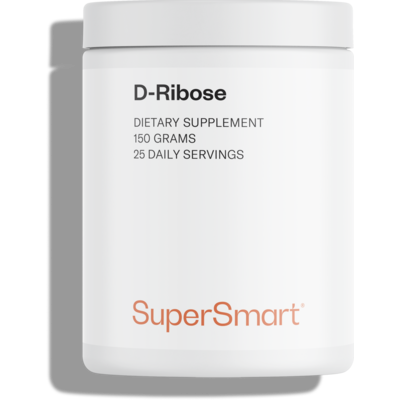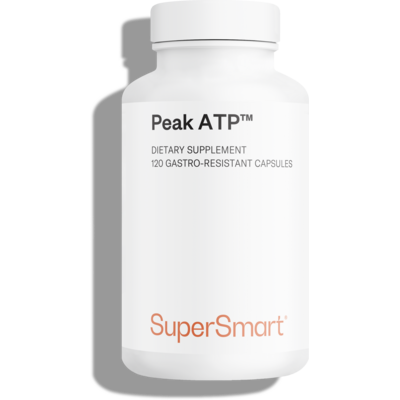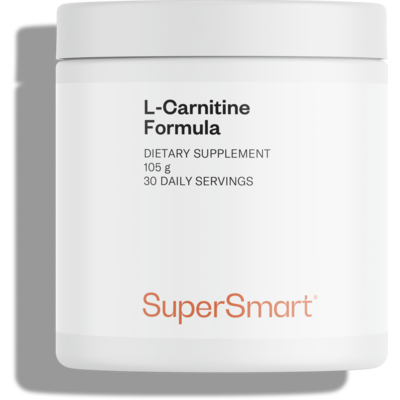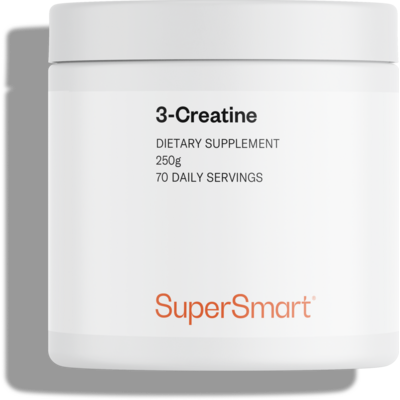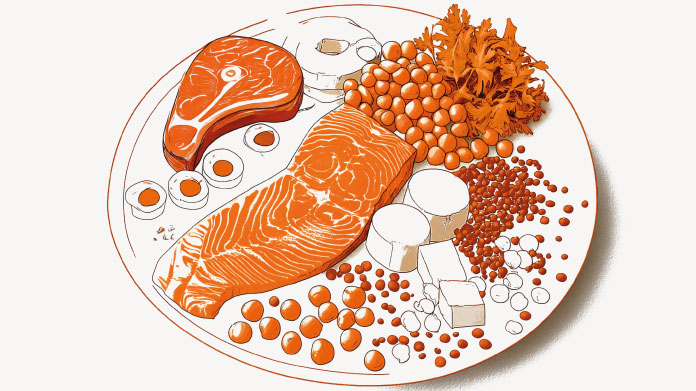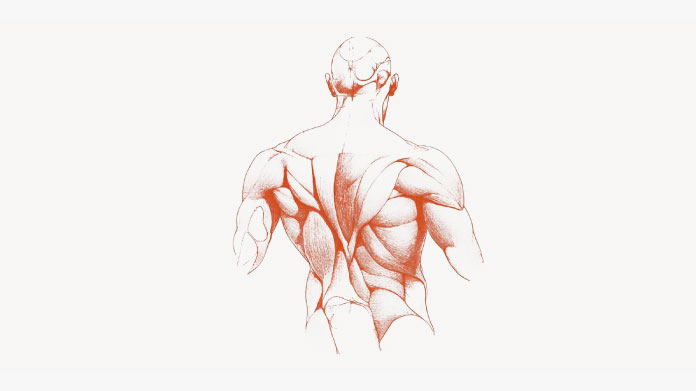What role does ATP play in the body and how can you boost it?
ATP is present in the cells of all living things. What exactly does it do and how can you increase production?

ATP: fuel for cells
Throughout the day, the body needs energy to perform multiple functions. For this, it uses a nucleotide called adenosine triphosphate (ATP), which serves as a kind of fuel for the cell, powering all its reactions (1).
During its hydrolysis, ATP releases one of its three phosphate ions for conversion into adenosine diphosphate (ADP): in doing so, it makes usable energy available to cells. In specific terms, ATP hydrolysis generates between 7 and 15 calories.
Adenosine triphosphate: a source of energy for everything!
While ATP is known mainly in the sports world, where athletes try to optimise the metabolic processes enabling its production, it’s important to understand that adenosine triphosphate is actually crucial for every function in the body.
Digestion, respiration, thermoregulation, maintaining blood concentrations, hormone production, brain function, acting on enzyme mechanisms, etc: ATP is truly multifunctional.
However, the body stores very little ATP, and thus biochemical reactions are constantly being activated to maintain ATP levels (2).
The different mechanisms of ATP synthesis
Aerobic metabolism
At rest, or during low to moderate intensity exercise when energy needs are modest, the body uses oxidation of carbohydrates and fats in the mitochondria (the cells’ ‘powerhouses’) to replenish ATP: this is ATP production by aerobic metabolism (3).
The most efficient mechanism, this can be thought of as a huge reservoir of energy with a low flow, and is therefore the best option for endurance exercise.
Lactic anaerobic metabolism
When exercise intensity reaches a moderate level, cells use glucose to produce ATP. As the intensity of the activity means greater flow rates, the pyruvate and hydrogen ions produced by glycolysis will undergo lactic fermentation, resulting in the production of lactate ions (4).
Alactic anaerobic metabolism
Finally, during short but very intense exercise (sprinting, weightlifting, etc.), it’s alactic anaerobic metabolism which is the preferred mechanism for producing ATP.
This type of metabolism relies on phosphocreatine as the ‘raw material’ for the reaction. However, the body’s phosphocreatine reserves are naturally very low which is why this system is only prioritised for intense but short bursts of exercise: think of it as a tiny reservoir with a huge flow.
Thus a key natural method of boosting ATP production is to engage in regular, moderate exercise. Endurance training (jogging, brisk walking, low-intensity cycling, etc) stimulates aerobic metabolism efficiency and enables ATP to be replenished more quickly and effectively in cells (5).
It’s also important to maintain a healthy and balanced diet sufficient to allow the body to produce ATP.
Supplements that boost ATP production
ATP capsules
For fatigue, loss of concentration and similar issues, you can take ATP capsules!
Adenosine triphosphate can actually be produced in a laboratory in a way that’s completely safe and usable by the body. So if you need to, try taking Peak ATP, a patented ATP formulation.
Creatine
The reason creatine is recognised for increasing performance during successive bursts of short, high-intensity exercise, as well as for improving the effects of resistance training on muscle strength in the over-55s, is precisely because it acts to renew ATP (6-7).
A close relative of amino acids, creatine is involved in cell energy metabolism and is primarily found in muscle and brain cells.
In cells, creatine combines first with a free phosphorus ion, and then - under the effect of the enzyme creatine kinase - this phosphorus ion combines with a molecule of ADP to form a new ATP molecule.
Effectively, therefore, creatine enables ATP to be renewed, hence its ability to increase physical performance during successive short and intense bursts of exercise: in the brief rest phases, creatine helps replenish ATP.
Creatine is therefore another excellent supplement for providing more ‘fuel’ for everyday life!
Additional supplements good for ATP production
We should also mention supplements containing D-Ribose, a major component of ATP (8). L-carnitine, meanwhile, helps transport long-chain fatty acids in the mitochondria to generate ATP (9).
SuperSmart ADVICE
References
- https://planet-vie.ens.fr/thematiques/cellules-et-molecules/les-roles-de-l-atp
- STOCK, Daniela, GIBBONS, Clyde, ARECHAGA, Ignacio, et al.The rotary mechanism of ATP synthase. Current opinion in structural biology, 2000, vol. 10, no 6, p. 672-679.
- DUDLEY, GARY A. et TERJUNG, RONALD L. Influence of aerobic metabolism on IMP accumulation in fast-twitch muscle. American Journal of Physiology-Cell Physiology, 1985, vol. 248, no 1, p. C37-C42.
- SPRIET, Lawrence L. Anaerobic metabolism during exercise. In : Exercise metabolism. Cham : Springer International Publishing, 2022. p. 51-70.
- WIBOM, Rolf, HULTMAN, Erik, JOHANSSON, Mats, et al.Adaptation of mitochondrial ATP production in human skeletal muscle to endurance training and detraining. Journal of Applied Physiology, 1992, vol. 73, no 5, p. 2004-2010.
- MAUGHAN, Ronald J. Creatine supplementation and exercise performance. International Journal of Sport Nutrition and Exercise Metabolism, 1995, vol. 5, no 2, p. 94-101.
- HAAKE, Paul et ALLEN, Gary W. Studies on phosphorylation by phosphoroguanidinates. The mechanism of action of creatine: ATP transphosphorylase (creatine kinase). Proceedings of the National Academy of Sciences, 1971, vol. 68, no 11, p. 2691-2693.
- Pauly DF, Pepine CJ. D-Ribose as a supplement for cardiac energy metabolism. J Cardiovasc Pharmacol Ther. 2000 Oct;5(4):249-58. doi: 10.1054/JCPT.2000.18011. PMID: 11150394.
- Virmani MA, Cirulli M. The Role of l-Carnitine in Mitochondria, Prevention of Metabolic Inflexibility and Disease Initiation. Int J Mol Sci. 2022 Feb 28;23(5):2717. doi: 10.3390/ijms23052717. PMID: 35269860; PMCID: PMC8910660.
- Chycki J, Kurylas A, Maszczyk A, Golas A, Zajac A. Alkaline water improves exercise-induced metabolic acidosis and enhances anaerobic exercise performance in combat sport athletes. PLoS One. 2018 Nov 19;13(11):e0205708. doi: 10.1371/journal.pone.0205708. PMID: 30452459; PMCID: PMC6242303.
Keywords
2 Days
Quick shipping
Quick shipping; good price. No issues!
Mary McCarty
3 Days
Thr product is very good and is helping…
Thr product is very good and is helping me on my health. Then is always on time
LUGO Luz
6 Days
Buying was fine
Buying was fine. I had problems with the website not recognizing my login info, and had to call to get it fixed. Other than that, everything was good.
David S. Clark
6 Days
Your super maca and super ginseng are…phenomenal
Your super maca and super ginseng are phenomenal supplements that compliment each other when taking them together. Fantastic feeling of well-being and lots of mid day energy without the crash.
Keith Mason
9 Days
I have had amazing results with every…
I have had amazing results with every supplement I've purchased. I am extremely satisfied with this company
kirstin Torres
9 Days
Fine products
Fine products . They are on the leading edge of online supplements. The only issue -so far-is they sometime run out of subscription items.
Jason Argos
12 Days
The ordering process is very user…
The ordering process is very user friendly and the products always come in a timely manner.
CARTER Rhonda
13 Days
The price for Dr
The price for Dr. Pero's AC-11 is reasonable and in line with his views. (my former colleague). Keep it pure.
CAMPBELL Clayton
16 Days
Right on every time.
Right on every time.
Arthur Nicholas
18 Days
They are cheaper than everyone else and…
They are cheaper than everyone else and the shipping was fast. Great company.
Patricia Adams
25 Days
Availability of quality health…
Availability of quality health supplements and it's wide variety is impressive. Ordering is seamless and shipping even during the holidays is well streamlined.
Mohamad Hussein
39 Days
A Product worth waiting for when not…
A Product worth waiting for when not available and then arriving as a surprise!
DOMINIC
41 Days
On time shipping
On time shipping
GEORGE Verne
43 Days
Ordering was easy and the product was…
Ordering was easy and the product was delivered with no problems. Appreciated that I was notified when it would arrive. Thanks!
MascarC
48 Days
Great customer service - responsive …
I ordered from them and my item was unavailable for sometime. I was super happy when they reactivated my order and shipped my item which arrived very quickly. Great customer service.
Ruth Rueter

